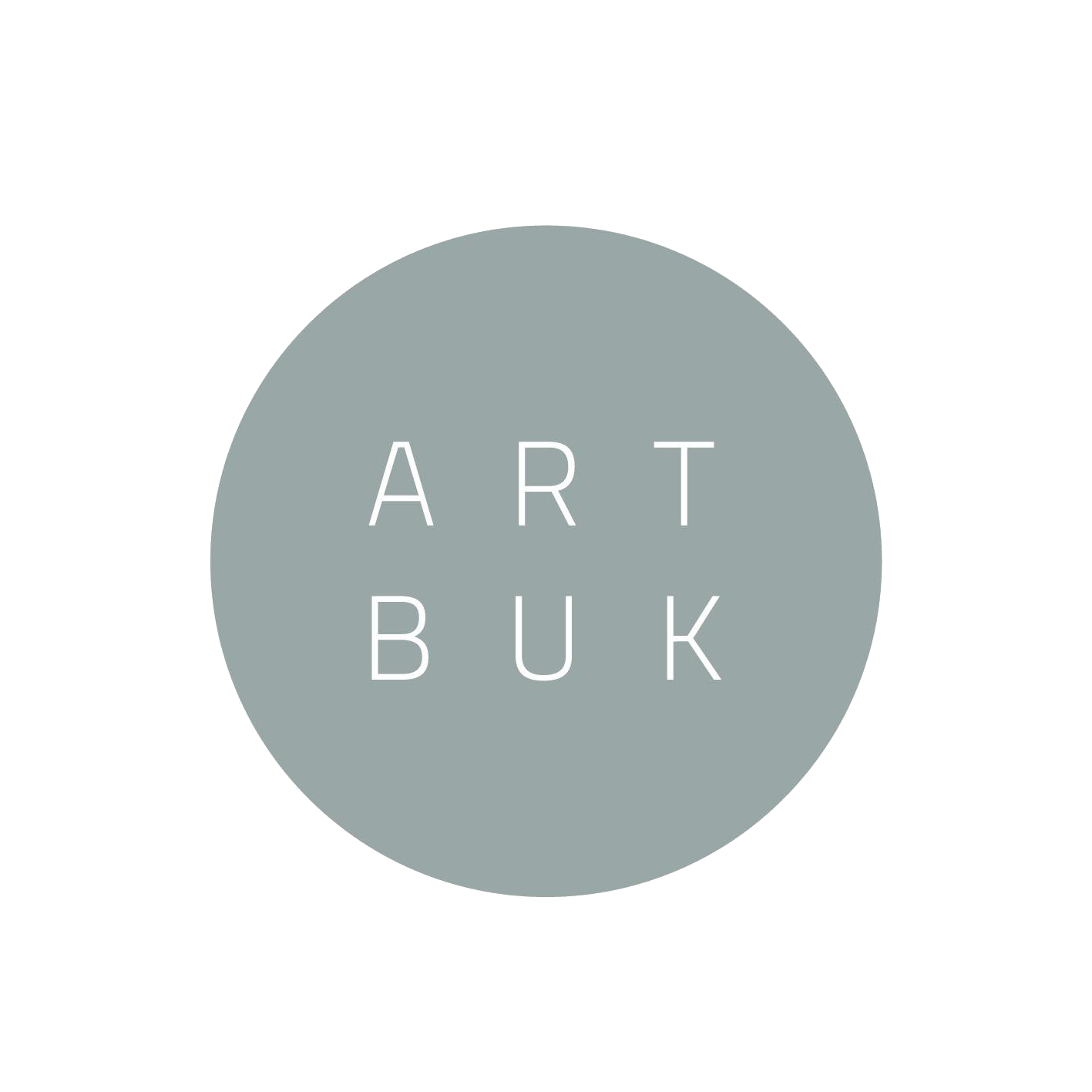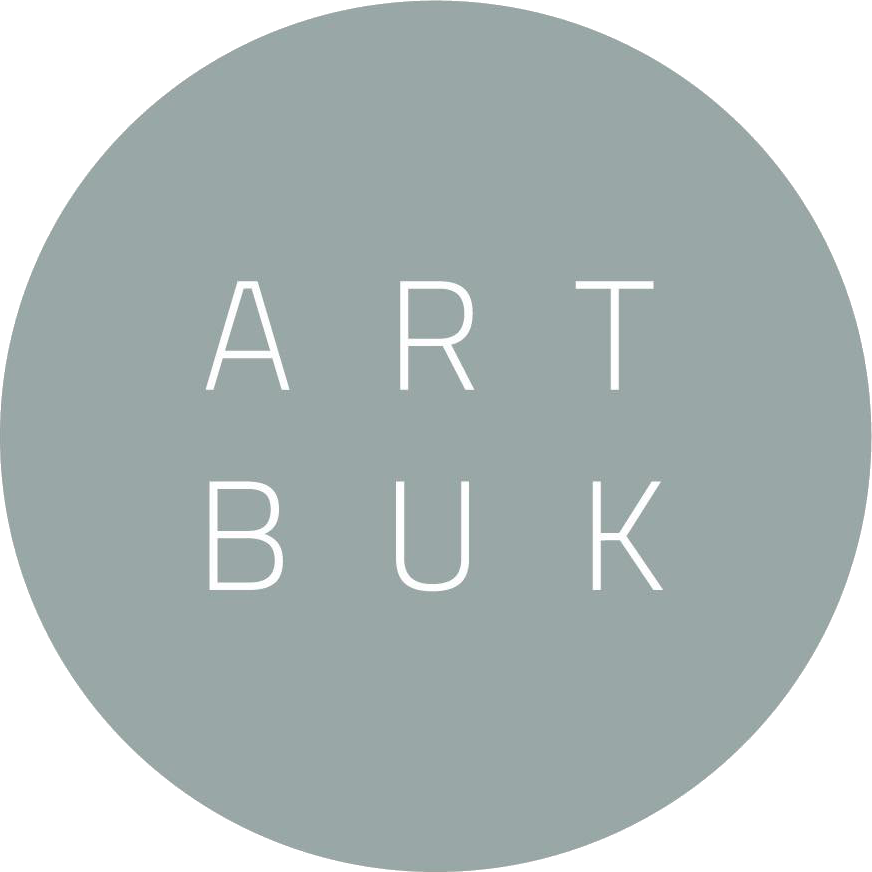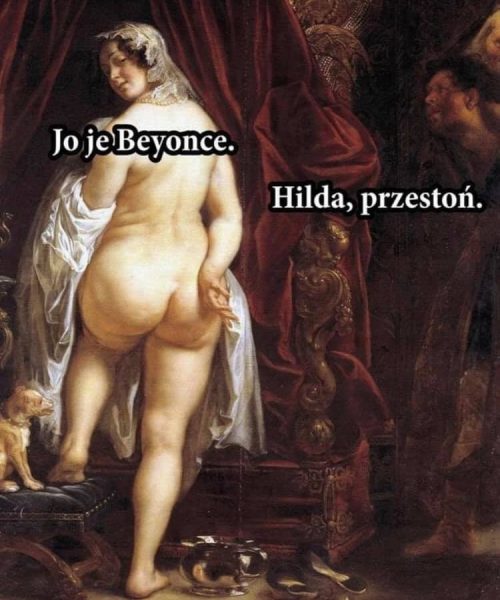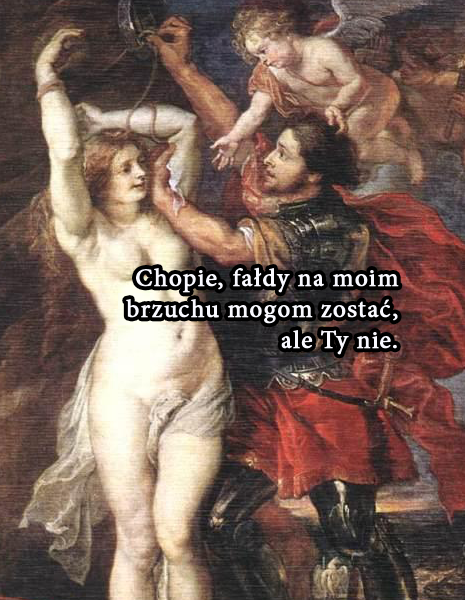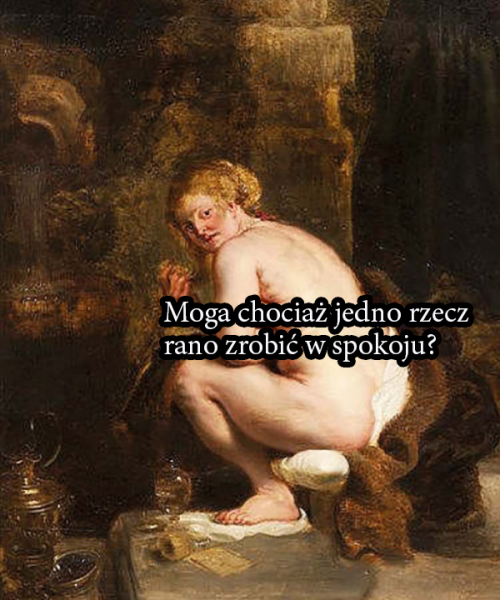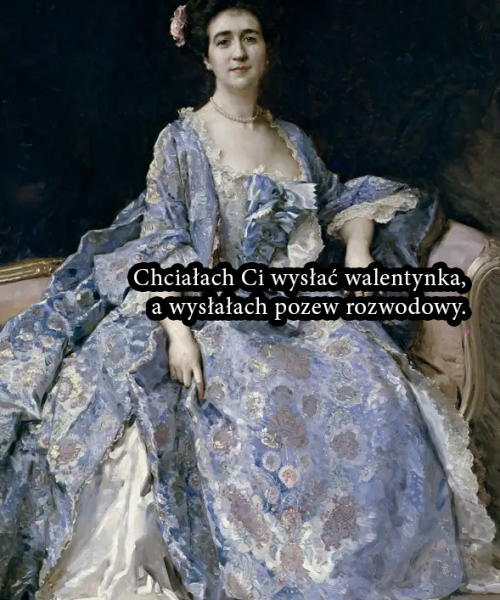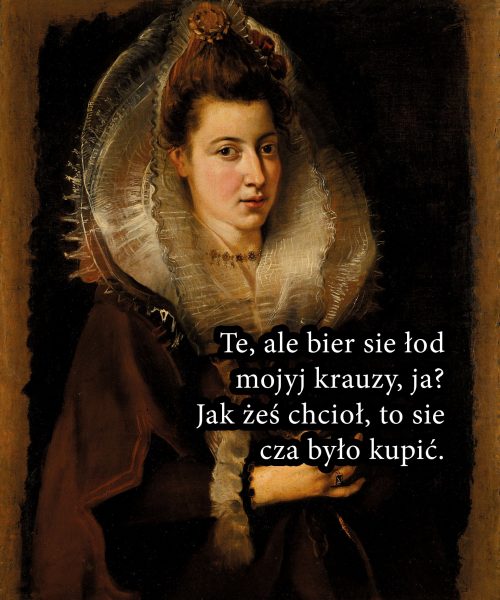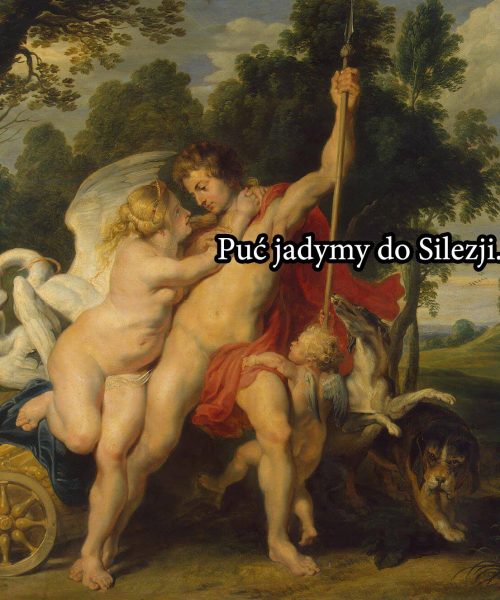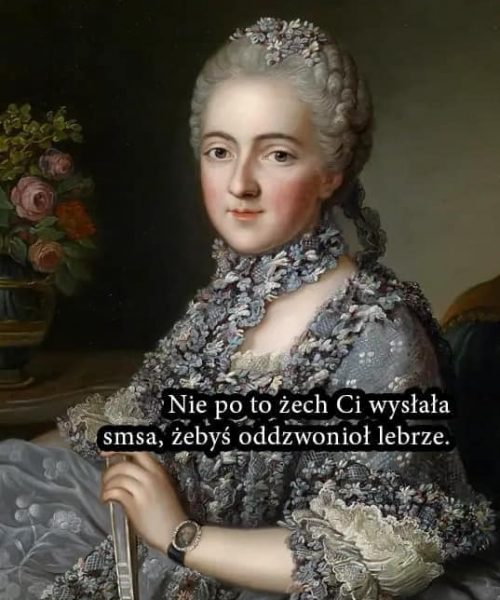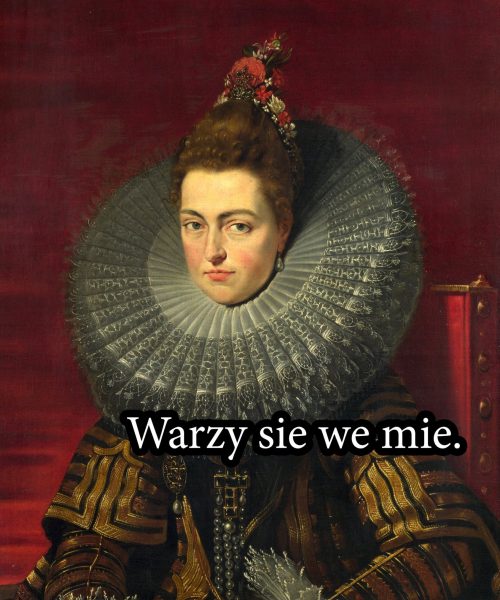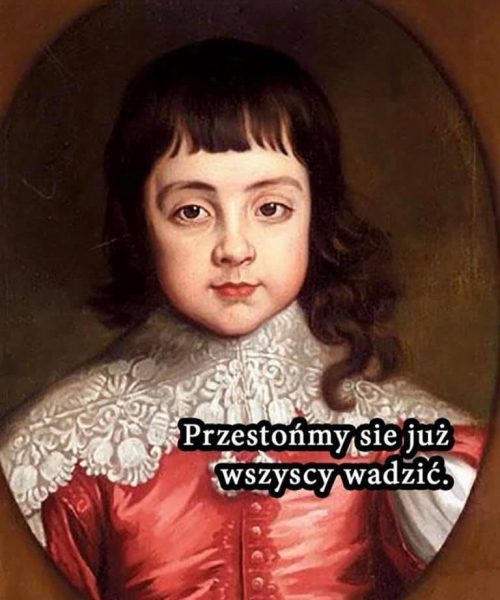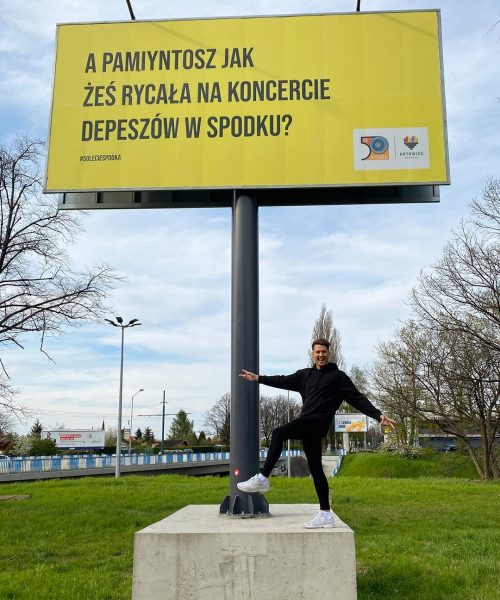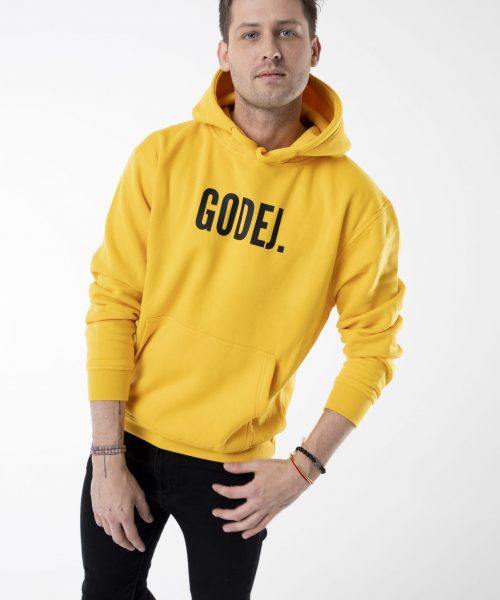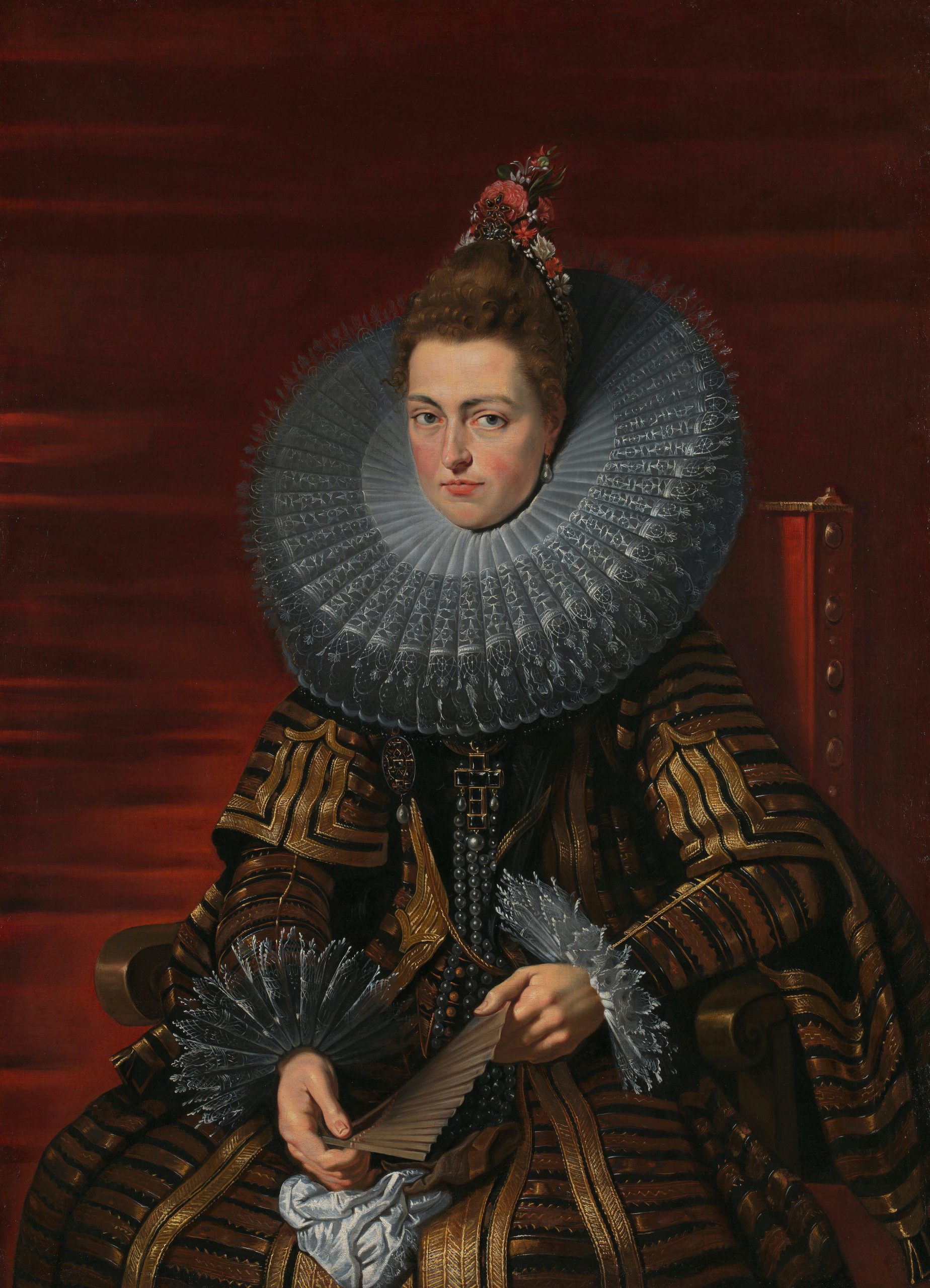
roulade and baroque
I’m sure this won’t be the first time somebody asks you this, but for the sake of kicking off this interview, how did you end up mixing Silesian dialect with the art of Peter Paul Rubens? A concept so original that it would’ve been hard to come up with something more surprising!
It was more than 5 years ago, 6 years almost. I used to work at an advertising agency. It was Friday, after Corpus Christi. I will remember that day forever because, after all, it changed my life. Even though all our clients were out of the office, because it’s usually a bank holiday, my boss insisted we come to the office. I didn’t really feel like working, so I surfed the web, chatted the time away with my colleague, and came across Rubens paintings, Rubens being an artist whom I’d always admired.
By the way, my grandmother is a painter, a self-taught painter but an amazing one nonetheless, and I remember that, in her paintings, there was often a lot of sadness on the characters’ faces, whereas in Rubens it is exactly the other way round. There is more passion, rage even, people casting judgmental looks. I found Rubens’ paintings to be wonderful and there was only one thing that was missing. And that thing was for someone to write down what’s actually there, in those people’s eyes.
I don’t know if we, the Silesians, have something special about us, but I think it might be the case. We are very expressive, very specific, and because of that we have something in common with the Flemish characters. Their look and facial expression reveal exactly what I’ve seen – and see to this day – on the faces of my fellow Silesians, and on my own face in the mirror when I want to be really thorough with someone. And that’s how it all started.
I was about to ask how it happened that, from among so many artists, you picked Rubens, a Baroque painter?
I love the Baroque in general. And that’s because I love glamor – as in really going over the top – which is ironic to me in itself. And what I like about the Baroque is that people would be wearing all these clothes, all this gold and jewelry, this luxury, and yet they were not ashamed of it at all – quite the contrary. Whoever had more, had more. In this snobbish atmosphere, it was as real as things could get. And that’s why I find Baroque painting to be so distinct. In different periods throughout history, great care was taken to ensure that things were nice and beautiful, and the aesthetic quality of art remained top priority, but in the Baroque style it’s the truth that comes to the fore. And this is clearly reflected in these paintings.
One could say that art was always in your blood. Considering your grandmother who paints, art must have had a strong presence in your day-to-day life.
Yes. I think my grandmother played a major role in shaping my sensitivity – the kind of sensitivity that’s the reason why I have the courage to do many things in life, because I can communicate with my inner self and with my feelings. Besides, when I was a kid, we used to paint together with my grandma. Though what I like to paint is modern art through and through, because that’s just how I roll (laughs).
I also remember that, when I was a child, my grandmother wouldn’t read to me ordinary children’s tales but titles such as Stories for the Spirit [lit.]. She read me different nurturing things and that was what shaped my brain a little differently, in a way that I could see more depth in ordinary, run-of-the-mill things.
In my family, this artistic sensitivity penetrates very much into everyday life. I wouldn’t call ours an artistic family, because we’re not; we do not have the characteristics of people who mingle with the so-called high art. It is more of an add-on to our everyday life that, even if unknowingly, has had a strong impact on many people in my family that propelled us forward.
So it’s fair to say that you had a solid foundation to build upon in order to do something creative in your life, didn’t you?
I think so, yes. Plus the foundation to think outside the box. My favorite things are those weird ones. (laughs)
What does your grandma think about this novel take on Rubens?
You could say she’s actually the godmother of this initiative, because when I made the meme “Jo je Beyonce”, my most popular one, my grandma said to me, despite not knowing who Beyonce was: “Post it on the web.” – and she’s 70 years old, mind you! – “Put it on the Internet, it will be crazy!” And it may be that my grandma is no oracle, but she predicted it. Because this meme is indeed my most viral one to date.
Do you remember which meme was your first?
I remember a few of them, but I’m not sure which was the first. It could have been the cover photo “Puć jadymy do Silezji”, but the memes that I remember the most are “Jo je Beyonce” and “Śpij Brajanku, niech ci się przyśni rolada”, as well as all other memes related to Brajanek. Those were my early days and I look back on them with great fondness.
What was the journey like from your first meme to the present day, if you could walk us through it? You are currently involved in numerous big projects and have recently published a book. Roobens was meant to be just fun or you knew there was more to it?
It was definitely fun, both for me and for my followers. And now I tell myself that my mission is to try and help people get off their high horse, so to speak, and laugh at what is happening around us, because every new day is a challenge. Whether you’re Catholic or believe in reincarnation, the only life that’s for certain is the one we’re living right now.
And especially now, when we are so busy with chasing our careers, we look at life as if each day was a fight for survival. It seems to me that, even if you can’t take life one day at a time, at least you can still laugh at it and that’s as close to joy as it gets. My mission is to find humor even in the most serious and difficult places, because when you laugh, your body releases endorphins and the brain gets more oxygen, so you end up having more fun. And it was like that from the beginning.
For a long time I had trouble monetizing that project because I was working professionally and didn’t consider it a viable source of income. Fast forward to now and Roobens grew to become an important phenomenon, and I am very happy about it. And while we do monetize the platform, it’s always according to my rules, always the way I want it. And even now that I started posting YouTube videos on my channel and I have a fantastic team who help me with the recording and optimization, it is still entirely personal.
My friends encouraged me to set up my own meme shop and that’s where it took off. And when I saw it work great and elevate what I do to a higher level, instead of being just a source of income, that fueled my enthusiasm even more.
You asked about my journey with Roobens. It’s a lot of new acquaintances – intimate connections. It’s two beautifully new friendships with people from Silesia whom I didn’t know before, but we met thanks to Roobens. It’s also an opportunity to experience the good side of being a public figure, because I have a very nice audience, so engaged and authentic. People don’t come up to me to just take a selfie, but they tell me about how they broke up with their partner after seeing my meme. That’s the kind of stories people share with me, which triggered a new series of events in my life and I find it fascinating. I’ve always tried to keep myself busy, but my life would have certainly been more boring if it weren’t for Roobens.
Let’s move on from Roobens the brand to Rubens the painter. I look at your memes and I realize it’s an extraordinary phenomenon indeed. In fact, many young people visiting museums probably wouldn’t have paid attention to Rubens if it weren’t for you. In a way, you gave Rubens a second youth, where just a few years ago it was unimaginable that someone could wear a T-shirt with one of his works. Do you take pride knowing that Rubens is living his renaissance thanks to you?
Yes, but at first I felt ill at ease, because I believe that our world isn’t limited to the three dimensions, but that we have a connection, whether we like it or not, with the people who used to live here before us. And so I was wondering if I was going to get chewed out by Peter Paul. But five years later it is my conclusion that, if things have been going so well for me, it’s probably the other way round, meaning that I count with Rubens’ support and blessing (laughs).
What makes me most happy is how young people discover art and sensitivity through modern technology and modern trends. In some schools, my memes are used as a resource in language or art classes. Someone wrote a thesis, a part of which concerned my work. My Polish teacher from school sent me a photo of an exam where a girl wrote Roobens instead of Rubens. Students also send me pictures of textbooks with Rubens’ paintings on which they overlay their own texts. And that’s very cool.
And it’s also the mission of your website to try and popularize art, often in an unconventional way. I believe that the problem with our society is that, having been so deeply affected by wars and the communism, people just don’t go to the theater. This is not our natural choice. But it’s not that we don’t like it or we feel too stupid for it, because in fact everyone has the right to perceive art in their own way. The point is that, for a long time, the art world seemed so elitist, so inaccessible, so tooted to the rank of national heritage (the word itself is so pathetic) that people now think it’s not for them.
And it seems to me there are more and more such movements that popularize art. It is the approach of young people, Gen Z, but also of Generation Alpha, that is people born after 2010, that the world is full as it is and we can draw from what’s already there, as we wish, and not from social constraints. And these are all very important movements – including what you are doing – that make art more inclusive.
Just like you introduced the art of P.P. Rubens to pop culture, you also put Silesian dialect on the map, and more specifically on billboards, and not just anywhere, but on Katowice’s Spodek multiarena, which celebrates its 50th anniversary this year. Do you also have memories related to that place, something like a Depeche Mode or Rammstein concert?
There is one billboard: Grosz mi na nerwach jak Jarre na laserach. I was once with my dad at a Jean-Michel Jarre concert, because my dad was a big fan, and I didn’t fully understand such music back then, but this concert stuck in my mind and the lasers started my fascination with Spodek. So that’s one memory. Another one is from when I was a kid and I was attending a children’s song gala (I don’t remember the name) but it’s a memory that’s been with me all these years, because I can recall the feelings that I experienced there and that’s something fantastic. After 10 years of living in Warsaw, I moved to Katowice and to this day Spodek evokes some truly strong emotions in me – it’s impressive, it’s like a magical spot on my map. Not only because of the distinct design but also because of what I experienced there.
Let’s talk about memes because Roobens is inseparable from that. We often approach memes in a trivial way, but they’re a powerful tool to convey all sorts of content, not just fun stuff. Your memes also touch on important social and political topics that are currently on the agenda in Poland. It’s not just laughing at a job you don’t like or at a failed relationship. What are memes for you?
First and foremost, it’s a huge information tube that’s much more impactful than regular news. Thanks to the humor and creative approach, you can often raise important topics and initiate discussion in a more inclusive way. I myself have raised issues such as the problem with designer drugs in Poland and I vocally supported the recent Women’s Strike. Many people on strikes had pickets with the meme “Warzy się we mnie” [lit. “It’s brewing in me”] and I myself picketed with it. I believe it was quite a strong message. There is also this meme “Przestańmy się wszyscy wadzić” [“Let’s all stop disturbing each other”]. I like to convey certain content in my own way. I don’t like the word ‘fight’ very much and I don’t really use it. I believe that a fight never brings anything good, there are always some ruins after it, someone always gets hurt.
For me, the issue that’s closest to my heart is LGBTQ+ rights, but also any social equality – whether it is LGBTQ+ or women’s rights. These are two top (unfortunately) topics in our country right now and it is so embarrassing that we still have to talk about it in the twenty-first century. I think that the meme, or rather the graphics, that I made on the spur of the moment and that had a very big impact was the one where I ask a question in Silesian referring to LGBT people. It went something like this: “And why do they have to flaunt like that? So that no child has to wonder whether it is better to kill themselves or be gay”. I went through this myself when I was a kid.
But, for me, there’s one conclusion. There is even a saying, and I’m paraphrasing, that when the devil wants to do something bad, there’s usually some good coming out of it. And it is a bit like that with our current government. Despite the enormous witch hunt and far-reaching restriction of women’s or LGBTQ+ freedom, the government managed to make, of what was previously a niche subject, a hot topic that many homes where gays used to be seen solely during pride parades on TV, or not seen at all, started to discuss what it means. And when you stop to think about it, you can’t but wonder where you yourself stand with all this. More and more people are mustering up the courage to tell their loved ones about their homosexuality. We begin to realize that this world is multi-layered.
I would therefore like to thank, of course with an ironic smile, our authorities for the fact that my grandmother’s friends, for example, although they do not understand that I am gay, refer to it with great respect, because it is, after all, so normal!
Last but not least, could I ask you to say hi to us and our readers in Silesian dialect?
Jak bez życie idzie sie z uśmiychym, to radszyj sie niy beczy, chyba, że ino ze szczynścio!
